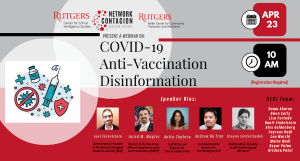Viral Disinformation and How Anti-Vaccine Propaganda Spreads Across Virtual and Real-World Networks
Viral Disinformation and How Anti-Vaccine Propaganda Spreads Across Virtual and Real-World Networks
Register Now
Webinar Overview:
Anti-vaccination disinformation around COVID-19 has been consistent and deliberate since the Covid-19 virus reached the United States in January 2020. The public has witnessed anti-vaccine motifs appearing on coordinated protest signs, highway overpasses, and most concerning, across all social media platforms. Much of the anti-vaccine disinformation is intentional, and social media influencers who amplify such disinformation simultaneously profit off of subscribers, books, “detoxes,” and vitamins they inaccurately claim will prevent Covid-19. Additionally, militant conspiracy groups now amplify anti-vaccine and Covid-19 disinformation in service to extremist views, adding an unexpected ideological vector to an already chaotic information environment.
Experts warn vaccine misinformation could significantly undermine progress in vaccinating the public in sufficient numbers to reach a critical threshold for herd immunity. Distrust in vaccine efficacy or safety, as well as potential attacks against vaccine supply and infrastructure now combine to pose significant risks with threat of lone actors, conspiracy groups, and state actors now interacting with one another across multiple platforms in ways that are difficult to track. Combating the contagion of disinformation thus requires a new paradigm of critical intelligence detailing how information spreads, a set of best practices to interpret and share such intelligence, and a set of tools that can help inform these practices to chart disinformation at a massive scale and in agile fashion.
Researchers from NCRI and Rutgers have developed a qualitative and quantitative overview that details the categories of anti-vaccine disinformation, identifies major online groups amplifying anti-vaccine disinformation, and best practices for countering antivaccination attitudes. Using industry leading OSINT techniques in combination with NCRI tools to perform a quantitative trend analysis on the prevalence and penetration of these narratives and a quantitative network exposition on the groups and actors that amplify the narratives in question, the researchers and their partners have organized the first NC Labs/Rutgers Webinar to educate and inform stakeholders and the public in an effort to combat the ongoing info-demic.


